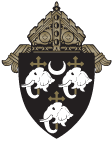Sometimes Christians are scared of doubt, and perhaps rightly so. When the ship becomes loosened from the moorings, even for a split second, panic can arise. I remember I used to know a priest who always framed the intentions at Mass by saying “Bless us Father, in our faith and in our doubt” and for some reason that phrasing always stuck with me.
The diagnosis of a terminal disease or the experience of evil and suffering in its most profound moments of seemingly incapacitating power can overwhelm even the most steadfast among us.
Pope Francis has recently received criticism in some quarters for the following statement on Mary, and her supposed doubt: “The Gospel tells us nothing: if she said a word or not … She was quiet, but in her heart – how much she said to the Lord! ‘You told me then – that’s what we have read – that he will be great. You told me that you would give him the throne of his father David, that he will reign over the house of Jacob forever. And now I see him there [on the cross]’ The Blessed Mother was human! And perhaps she would have wanted to say, ‘Lies! I have been cheated!’ John Paul II said this when he spoke of the Mother of God at one point. But she was overshadowed with the silence of the mystery that she did not understand, and with this silence, she has accepted that this mystery can grow and flourish in hope.”
The reference to John Paul is widely interpreted to allude to a much more muted presentation of Mary’s reaction to the Passion in his encyclical Redemptoris Mater.
Francis went on elsewhere in an interview to say “Who of us – all all! – Who of us has not experienced uncertainty, confusion and even doubt on a journey of faith? All! We’ve all experienced this: I also. Everybody. It is part of the journey of faith, it is part of our lives. All this ought not surprise us, because we are humans, marked by weaknesses and limitations. Do not be alarmed. We all have weaknesses and limitations!”
He often juxtaposes what he sees as these universal moments of honest perplexity with what he calls “satanic curiosity.” In the former, we see Elijah doubting God’s existence as he tries to recognize him in the storm, fire and earthquake, before finding him in the still, small voice, and Jonah, who was so bewildered by God’s sparing the Ninevites that he became embittered under the gourd tree. (Somehow it’s amusing to me that the official translation in the UK calls it the “castor oil plant,” little differences continue to grab my attention).
Even those closest to the human Jesus famously underwent bouts of bafflement, misunderstanding, and doubt -Peter’s “Save me Lord, for I am drowning!” or frustrated “You know all things; you know that I love you,” the Baptist’s “Are you the one to come or shall we look for another?”
This is the honest perplexity Francis describes. What is different for him is the “devilish curiosity” which seeks to know Jesus’ identity only to take measures against him – the temptation in the desert, those asking for signs or mockingly demanding Jesus save himself from the cross, the Pharisees trying to trap him into misstatements about Caesar’s authority or punishing the adulterous woman or marriage arrangements in the afterlife.
He gives an extended reflection of this dichotomy in the Magi’s seeking to learn the Infant’s whereabouts, as compared to Herod’s attempt to do the same. “Our honest perplexity always remains opens to God’s salvation, but our idle curiosity does not. In our hearts we experience the contradiction inherent in our search for truth: on the one hand we may truly desire to find the truth (or at least desire to desire); on the other hand we may seek the truth in order to control it. In one case, we inquire; in the other, we argue.”
It remains for us as a community of professed followers of the Way, the Truth and the Light to honestly and self-critically appraise our inevitable doubts, so as to fall in the former category and not the latter.
Written by Michael M. Canaris, Ph.D., for the Feb. 21, 2014 edition of the Catholic Star Herald.
